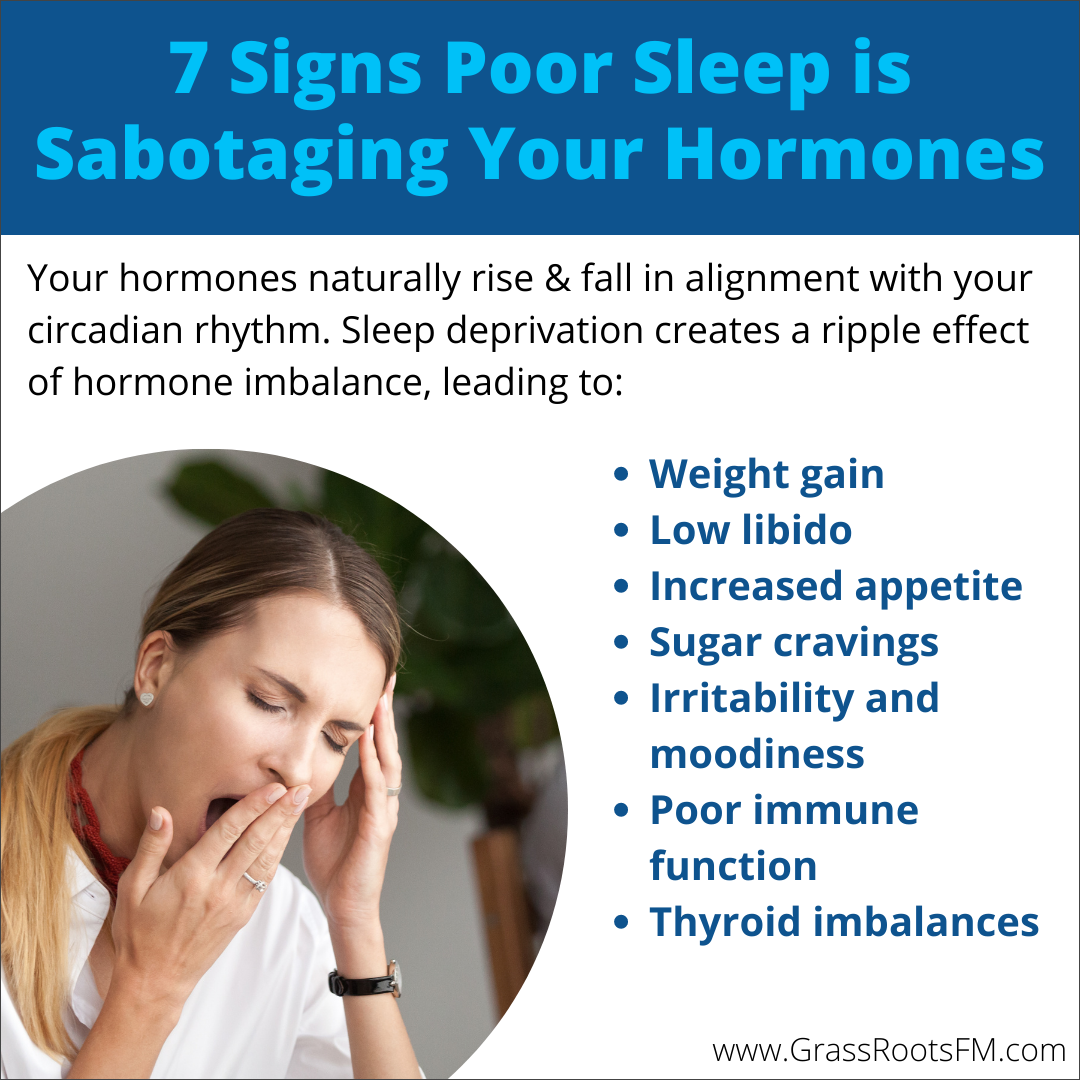As we covered a few weeks ago, your hormones naturally rise and fall in synchronicity with your sleep-wake cycle. Certain chemical messengers (AKA hormones) peak in the morning to help you wake up and re-ignite your appetite. Others help you maintain balanced blood sugar and energy throughout the day. Others rise in the evening to help you power down and regenerate overnight.
Beyond their temporal cycles, they also increase and decrease in response to each other. Some rise in unison, while others work like a teeter-totter, one goes up while the other goes down.
This means that when we get too little sleep and the cycle is disrupted, it can cause a ripple effect among stress, sex, thyroid, hunger, and growth hormones.
And while you may not be an expert in the mechanics of hormone signaling and circadian rhythm (yet!), you can probably recognize the symptoms:
- Weight gain
- Low libido
- Increased appetite and overeating
- Sugar cravings
- Irritability and moodiness
- Poor immune function
- Thyroid imbalances

Let’s look at how sleep deprivation affects your hormone levels and practical tips to improve your sleep.
6 Ways Sleep Deprivation Sabotages Your Hormones
1. Elevated Cortisol
When your body doesn’t have time to rest and recover, it remains in a state of stress and produces more cortisol as a result. Prolonged periods of elevated cortisol can weaken immune function, decrease thyroid function, and increase your risk for chronic disease.
Furthermore, your cortisol levels should peak within 30 minutes of waking up in what’s known as the cortisol awakening response (CAR). This natural spike sets off your thyroid and sex hormones for the day, so when it’s disrupted the whole system feels the effects.
2. Irregular Insulin Levels
Studies have shown that people with sleep deprivation show abnormalities in insulin. This increases your risk for insulin resistance and type 2 diabetes and can wreak havoc on your thyroid hormones and cortisol levels.
3. Reduced Thyroid Function
When sleep deprivation keeps cortisol elevated and disrupts the cortisol awakening response, it impacts thyroid function in a number of ways. Your hypothalamus and pituitary gland slow thyroid hormone production, more of your thyroid hormones are stuck in their inactive state as T4 to T3 conversion is reduced, and your cells become less responsive to thyroid hormones (creating higher and higher demand).
4. Lowered Leptin
Leptin helps regulate your appetite and fat storage by signaling to your brain when you’re full. Lack of sleep decreases this satiety hormone, which can lead to overeating and weight gain. It also plays a role in fertility, immune function, and brain function, which can suffer as well.
5. Decreased Testosterone & Estrogen
When hormone production shifts toward cortisol, there are fewer sex hormones made. This is your body’s way of prioritizing since it knows you need stress hormones to stay alive, but you don’t need sex to survive. With decreased testosterone and estrogen comes low libido, poor concentration, and loss of muscle mass.
6. Slowed Growth Hormone & Cell Repair
In adults, growth hormone is responsible for regenerating tissue that is damaged or aging. It also plays a role in glucose metabolism by maintaining stable blood sugar as you fast overnight. When growth hormone levels are lowered, you may age faster, recover slower, and retain more belly fat.
How to Promote Restful Sleep
If you’re chronically behind on sleep and feeling the effects, I recommend comprehensive hormone testing to get a complete picture of your sex and adrenal hormone levels, hormone metabolism (how you’re breaking them down), and nutritional markers related to hormones and neurotransmitters.
You can then work with a functional medicine provider to create a personalized protocol to restore your natural hormone balance using lifestyle strategies, diet, and supplements.
In the meantime, here are a few practical strategies you can use to get a full night of restorative sleep!
- Go to bed and wake up around the same time every day.
- Get natural sunlight exposure first thing in the morning (even through a window is better than nothing!).
- Create a wind-down routine that includes a stress relief activity so you can prepare your mind for rest.
- Avoid electronic screens one to two hours before sleep.
- Try taking magnesium before bed. Magnesium L-threonate is the only form shown to cross the blood-brain barrier and helps promote relaxation and sleep. For comprehensive support, try the RootFix Stress & Sleep Support Kit.
- Maintain balanced blood sugar by eating lean protein, healthy fats, and complex carbs with every meal.
- Get regular exercise, even better if it’s outside.
- Minimize sugar after a night of poor sleep to counterbalance the resulting insulin disruption.
About the Author: Dr. Seth Osgood is a Doctor of Nursing Practice, Board Certified Family Nurse Practitioner and Institute of Functional Medicine (IFM) Certified Practitioner. Dr. Osgood received his post-graduate training in Functional Medicine through the IFM and from working with Dr. Amy Myers. He has helped people from around the world improve their health utilizing a Functional Medicine approach.




